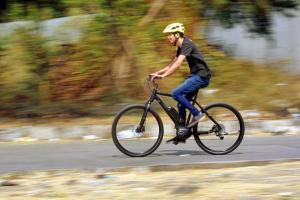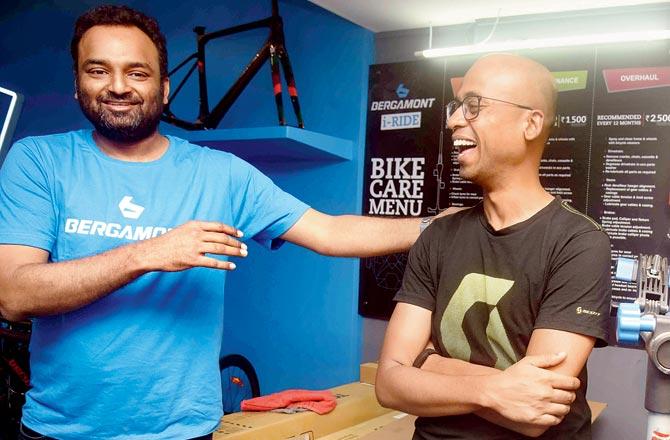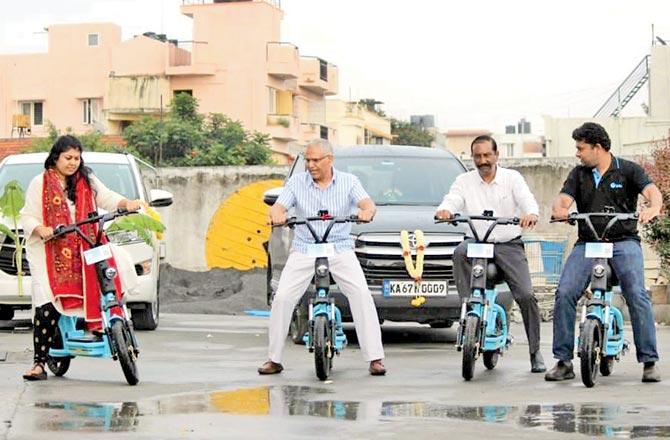E-bikes can offer multiple solutions for city commuters, and the launch of a new one in India offers hope in a nascent market

The mid-day writer tests the e-bike. Pics/Atul Kamble
It's post noon. Morning peak hours are supposed to be over. But the traffic on the way to Wadala says otherwise. It's like an urban portrait of still life. The incessant honking is anything but music to the ears, and the fumes emanating from the cars smell like the opposite of roses. There's a palpable impatience in the area's polluted air when the driver of the auto I am in says that this is how far he can go. Only taxis are allowed hereafter. Tough luck. So I get off and change my mode of CNG transport to reach my destination, a shop called The Cycle Worx, which has launched an in-house store for an e-bike called Bergamont. That's what I am out to test-ride.
But on reaching, Debjyoti Mandhata — my guide for the afternoon who is part of the product team at the firm that owns the brand — suggests that I begin by trying out one of their basic bicycles. "Yes, let's tire him out first," Sameer Meisheri, the store's owner, jokes. So be it. Mandhata gets on an e-bike, and I start pedaling on its country cousin. The ride, to be fair, is quite a smooth one. But it's not what I am here for. So after about 200 metres, before I am actually tired, Mandhata and I exchange transports. It's my first ever time on an e-bike.
ADVERTISEMENT

The Cycle Worx in Wadala
What's the difference, though? Well, for starters, there's a Bosch battery fixed to a spoke in the front end of the e-bike that gives it a thrust even when you aren't actually using your legs to move it forward. That's essentially what sets it apart from a regular cycle. There are also added features like four modes — turbo, sport, tour and eco — that you can choose from depending on your terrain and how fast you want to ride. The maximum speed you can hit is 25 km/hr, after which the electric assistance is cut off in line with government regulations. And there's even a knob that lets the bike move on its own when you're strolling with it, making it akin to a dog tugging on its leash when you've taken it out for a walk.

Sameer Meisheri (left) and Debojyoti Mandhata
But how's the experience overall? Excellent, in one word. There really is minimal effort involved. Mandhata and I take rounds of the streets in front of the shop, and having not been on any sort of cycle for donkey's years, the amount of fun I have is a perfect 10. But having fun isn't really the point of the e-bike. Daily commuters in Mumbai or any other Indian city will attest to the congestion that our roads involve. E-bikes can help ease that. They are, of course, a more ecologically viable option, too, especially given the climate crisis that seems to have become an increasing reality in the 21st century world. The problem, though, lies in the fact that the Indian market still hasn't woken up to these possibilities. And the government, on its part, has done precious little to sensitise us. That's why there still isn't a single public charging station for such vehicles in the entire city. Western countries and China are miles ahead of us in this regard, Mandhata informs. It's a crying shame, honestly. Let's say your place of work is about 5 km from your home. Wouldn't it be a good idea then to charge your battery overnight for five hours, hop on to an e-bike and bypass the cars that are anyway travelling at a snail's pace given traffic in Mumbai?
It would, and Mandhata points out that a part of their clientele also includes middle-aged people who want to reap the health benefits, apart from those looking for off-road adventures like mountain biking. But that base of customers should ideally expand to a far greater number of people, with other brands available in the city such as Ryder Cycles and Lightspeed. Wadala, for one, would then be a far happier place to commute to, and not the traffic nightmare that I found myself in on the way to The Cycle Worx.
Time 10.30 am to 8.30 pm
At The Cycle Worx, A/2, Godown no 9, Wadala Truck Terminal.
Call 9930050808
Cost Rs 1.6 lakh
Kharghar's rent-and-ride success story

Mumbai can take a leaf out of Kharghar's book. In November last year, the satellite suburb in Navi Mumbai opened its arms to an Indian e-bike brand called Yulu, which is meant for the public to rent and share. All you have to do is download the eponymous app, reach a 'Yulu zone', scan a QR code, pay a nominal rental cost of '10 for every 10 minutes, and drop it off at another Yulu zone. Deepak Sharma, the firm's operations manager, tells us that people use it a lot to commute to the Kharghar station and back. He adds that the fact that it's meant exclusively for public sharing means that it's an even lesser burden on our roads than personal e-bikes. And the good news is that they plan to launch in BKC in about 10 days' time.
What to keep in mind
First, ask yourself what you want an e-bike for before buying one. Mountain bikes, for instance, have different specifications from ones meant for urban roads. Next, figure out how much you'd need the battery to last. And finally, make sure the motor is of a trusted company since that's where the magic lies.
Catch up on all the latest Mumbai news, crime news, current affairs, and also a complete guide on Mumbai from food to things to do and events across the city here. Also download the new mid-day Android and iOS apps to get latest updates
 Subscribe today by clicking the link and stay updated with the latest news!" Click here!
Subscribe today by clicking the link and stay updated with the latest news!" Click here!






